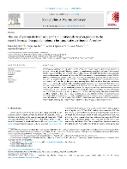| dc.contributor.author | Gayibov, Emin | |
| dc.contributor.author | Sychra, Tomáš | |
| dc.contributor.author | Spálenková, Alžběta | |
| dc.contributor.author | Souček, Pavel | |
| dc.contributor.author | Oliverius, Martin | |
| dc.date.accessioned | 2025-01-07T08:10:53Z | |
| dc.date.available | 2025-01-07T08:10:53Z | |
| dc.date.issued | 2025 | |
| dc.identifier.uri | https://hdl.handle.net/20.500.14178/2776 | |
| dc.description.abstract | Patient-derived organoids (PDOs) and xenografts (PDXs) are powerful tools for personalized medicine in pancreatic cancer (PC) research. This study explores the complementary strengths of PDOs and PDXs in terms of practicality, genetic fidelity, cost, and labor considerations.Among other models like 2D cell cultures, spheroids, cancer-on-chip systems, cell line-derived xenografts (CDX), and genetically engineered mouse models (GEMMs), PDOs and PDXs uniquely balance genetic fidelity and personalized medicine potential, offering distinct advantages over the simplicity of 2D cultures and the advanced, but often resource-intensive, GEMMs and cancer-on-chip systems.PDOs excel in high-throughput drug screening due to their ease of use, lower cost, and shorter experimental timelines. However, they lack a complete tumor microenvironment. Conversely, PDXs offer a more complex microenvironment that closely reflects patient tumors, potentially leading to more clinically relevant results. Despite limitations in size, number of specimens, and engraftment success, PDXs demonstrate significant concordance with patient responses to treatment, highlighting their value in personalized medicine.Both models exhibit significant genetic fidelity, making them suitable for drug sensitivity testing. The choice between PDOs and PDXs depends on the research focus, resource availability, and desired level of microenvironment complexity. PDOs are advantageous for high-throughput screening of a diverse array of potential therapeutic agents due to their relative ease of culture and scalability. PDXs, on the other hand, offer a more physiologically relevant model, allowing for a comprehensive evaluation of drug efficacy and mechanisms of action. | en |
| dc.language.iso | en | |
| dc.relation.url | https://doi.org/10.1016/j.biopha.2024.117750 | |
| dc.rights | Creative Commons Uveďte původ 4.0 International | cs |
| dc.rights | Creative Commons Attribution 4.0 International | en |
| dc.title | The use of patient-derived xenografts and patient-derived organoids in the search for new therapeutic regimens for pancreatic carcinoma. A review | en |
| dcterms.accessRights | openAccess | |
| dcterms.license | https://creativecommons.org/licenses/by/4.0/legalcode | |
| dc.date.updated | 2025-01-13T12:10:50Z | |
| dc.subject.keyword | Pancreatic Neoplasms | en |
| dc.subject.keyword | Heterografts | en |
| dc.subject.keyword | Organoids | en |
| dc.subject.keyword | Models | en |
| dc.subject.keyword | Animal | en |
| dc.subject.keyword | Chemotherapy | en |
| dc.subject.keyword | Adjuvant | en |
| dc.identifier.eissn | 1950-6007 | |
| dc.relation.fundingReference | info:eu-repo/grantAgreement/MSM//LX22NPO5102 | |
| dc.relation.fundingReference | info:eu-repo/grantAgreement/UK/GAUK/GAUK308223 | |
| dc.relation.fundingReference | info:eu-repo/grantAgreement/MZ0/NU/NU24-03-00024 | |
| dc.date.embargoStartDate | 2025-01-13 | |
| dc.type.obd | 73 | |
| dc.type.version | info:eu-repo/semantics/publishedVersion | |
| dc.identifier.doi | 10.1016/j.biopha.2024.117750 | |
| dc.identifier.eidScopus | 2-s2.0-85211986019 | |
| dc.identifier.obd | 656160 | |
| dc.identifier.pubmed | 39689516 | |
| dc.subject.rivPrimary | 30000::30100::30104 | |
| dc.subject.rivSecondary | 30000::30200::30204 | |
| dcterms.isPartOf.name | Biomedicine & Pharmacotherapy | |
| dcterms.isPartOf.issn | 0753-3322 | |
| dcterms.isPartOf.journalYear | 2025 | |
| dcterms.isPartOf.journalVolume | 182 | |
| dcterms.isPartOf.journalIssue | January | |
| uk.faculty.primaryId | 111 | |
| uk.faculty.primaryName | Lékařská fakulta v Plzni | cs |
| uk.faculty.primaryName | Faculty of Medicine in Pilsen | en |
| uk.faculty.secondaryId | 110 | |
| uk.faculty.secondaryName | 3. lékařská fakulta | cs |
| uk.faculty.secondaryName | Third Faculty of Medicine | en |
| uk.department.primaryId | 100012968318 | |
| uk.department.primaryName | Biomedicínské centrum | cs |
| uk.department.primaryName | Biomedical Center | en |
| uk.department.secondaryId | 623 | |
| uk.department.secondaryName | Chirurgická klinika 3. LF UK a FNKV | cs |
| uk.department.secondaryName | Department of General Surgery 3FM CU and UHKV | en |
| dc.type.obdHierarchyCs | ČLÁNEK V ČASOPISU::článek v časopisu::přehledový článek | cs |
| dc.type.obdHierarchyEn | JOURNAL ARTICLE::journal article::summarizing article | en |
| dc.type.obdHierarchyCode | 73::152::205 | en |
| uk.displayTitle | The use of patient-derived xenografts and patient-derived organoids in the search for new therapeutic regimens for pancreatic carcinoma. A review | en |

